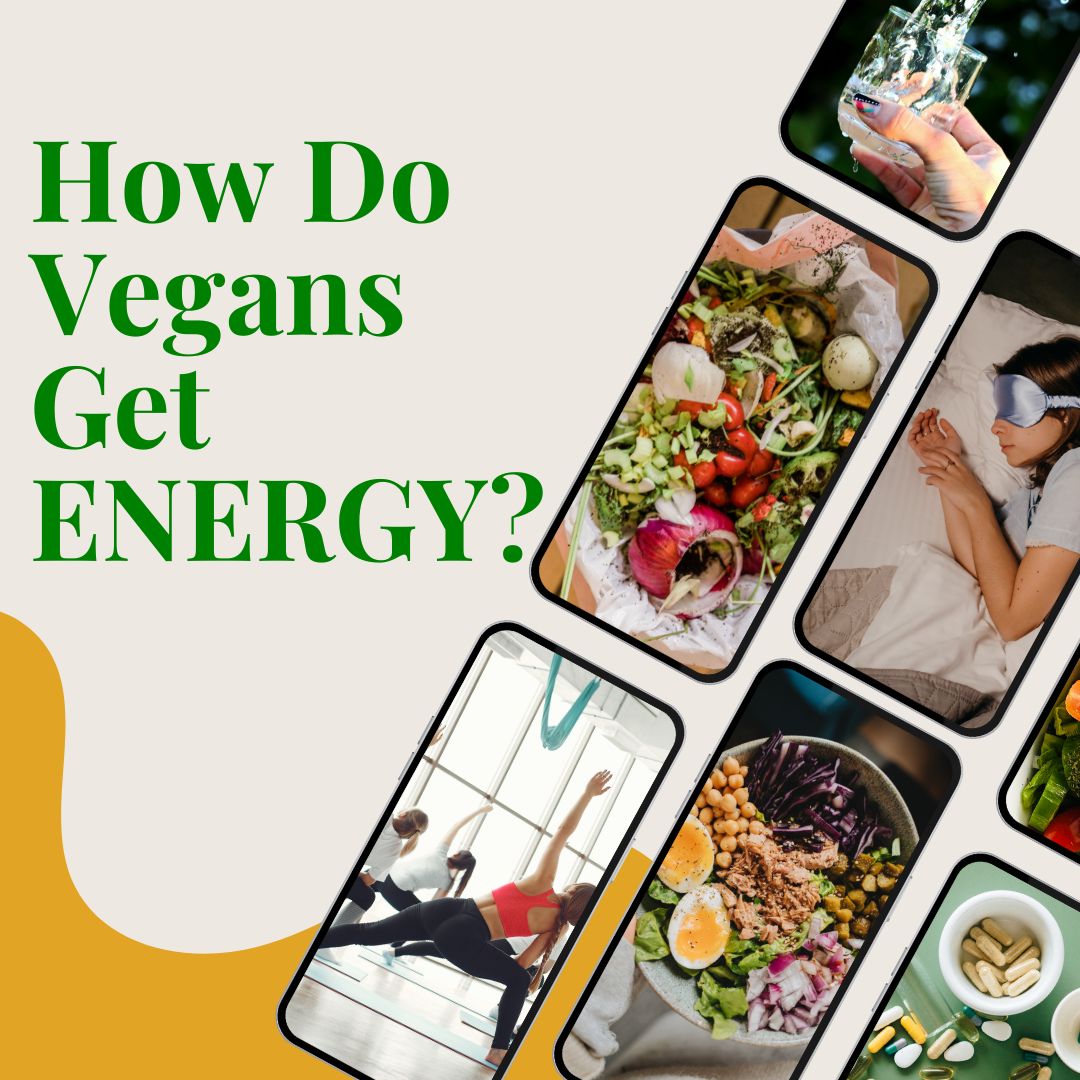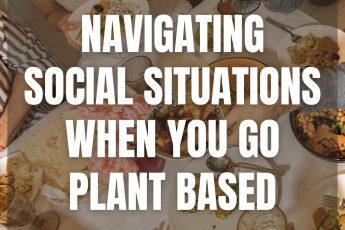When people hear the word “vegan,” one of the most common questions that comes up is, Where do you get your energy? There’s a lingering misconception that a plant-based lifestyle leaves you feeling sluggish or low on fuel. In reality, a well-balanced vegan diet is filled with nutrient-rich foods that support steady, lasting energy. Understanding vegan foods that give you energy makes it clear how plant-based eaters stay energized and vibrant throughout the day. It’s important to note that while these are widely accepted plant-based ideas for staying energized, it’s always a good idea to check with a healthcare professional for personalized advice.
The Key Building Blocks of Vegan Foods That Give You Energy
Before diving into specific nutrients, it helps to look at the main components that power the body every day. These building blocks – Carbohydrates, healthy fats, and protein – work together to deliver both quick and long-lasting fuel.
Carbohydrates: The Primary Energy Source
Carbohydrates are the body’s main source of energy, and plant-based eaters have no shortage of high-quality options. When carbs are eaten, they’re converted to glucose, giving your cells the fuel they need to function. The key is focusing on complex carbohydrates that release energy slowly and steadily throughout the day.
These include whole-food staples such as:
- Whole grains like quinoa, oats, and brown rice
- Legumes like chickpeas, black beans, and lentils
- Starchy vegetables like sweet potatoes, butternut squash, and corn
Unlike sugary snacks that cause energy spikes and crashes, complex carbs offer the kind of reliable fuel that keeps you going. They also come packed with fiber, vitamins, and minerals, true multitaskers for sustained energy.
Generally Accepted Healthy Fats for Long-Lasting Fuel
Healthy fats provide another layer of steady energy, helping the body absorb nutrients and maintain balanced blood sugar. This section highlights how plant-based fats keep energy levels stable and support brain function, hormone health, and fullness between meals.
Plant-based sources include:
- Avocados
- Nuts and nut butters
- Seeds like chia, hemp, and flax
- Olive oil
A drizzle of olive oil, a spoonful of almond butter, or a sprinkle of chia seeds can go a long way in supporting long-lasting fuel.
Protein for Recovery and Steady Energy
While protein isn’t the body’s first choice for fuel, it plays a major role in recovery, satiety, and maintaining stable energy levels. This section helps readers understand how vegan protein fits into the bigger picture of daily energy.
Great plant-based sources include:
- Lentils
- Tofu
- Tempeh
- Beans
- Edamame
- Plant-based meat alternatives
A simple way to add a morning protein boost is with a daily PLANT-BASED POWER SMOOTHIE made with unsweetened almond milk, vegan protein powder, leafy greens, berries, and ground flax or chia seeds. It delivers a clean, energizing start to the day.
Key Nutrients That Support Energy
This section introduces the specific nutrients that help convert food into usable energy. Understanding these key players makes it easier to build meals that support better focus, stamina, and vitality.
Iron and Energy Levels
Iron is essential for carrying oxygen throughout the body. Low iron levels can lead to fatigue, making plant-based sources especially important to include regularly. Vegan-friendly iron options include:
- Spinach
- Lentils
- Pumpkin seeds
- Tofu
- Fortified cereals
Pairing iron-rich foods with vitamin C, such as citrus, berries, or bell peppers, improves absorption and helps keep energy levels steady.
Vitamin B12
Vitamin B12 supports red blood cell formation and energy production. Since it’s primarily found in animal products, vegans can meet their needs through fortified foods or a simple daily supplement.
Great fortified options include:
- Plant milks
- Fortified Nutritional yeast
- Breakfast cereals
Magnesium
Magnesium plays a role in converting food into energy and supporting muscle and nerve function. Many plant-based foods naturally contain magnesium, making it easy to meet daily needs.
Common sources include:
- Almonds
- Sunflower seeds
- Whole grains
- Leafy greens
Magnesium is gaining attention for its potential benefits for sleep, mood, and energy. The Healthline article 12 EVIDENCE-BASED HEALTH BENEFITS OF MAGNESIUM offers a helpful overview of why this mineral has become so popular.
Vegan Foods That Give You Energy
This section highlights energizing foods directly, offering readers a clear list of plant-based options that help power the day. These foods are nutrient-dense, satisfying, and easy to incorporate into everyday meals.
Some of the best vegan foods that give you energy include:
- Oats
- Bananas
- Lentils
- Sweet potatoes
- Quinoa
- Chickpeas
- Almonds
- Pumpkin seeds
- Berries
- Leafy greens
- Peanut butter
- Chia and flax seeds
These whole foods deliver a combination of complex carbs, protein, fiber, and healthy fats, the perfect recipe for sustained energy.
Sample Day of High-Energy Vegan Eating
Sometimes the easiest way to understand vegan foods that give you energy is to see how they fit into a typical day. Here’s a simple, balanced example to show how energizing meals can come together without much effort.
Breakfast
- Oatmeal topped with chia seeds, blueberries, and a spoonful of almond butter
Mid-Morning Snack
- Apple slices with peanut butter
- A handful of almonds
Lunch
- Quinoa bowl with roasted sweet potatoes, black beans, spinach, and avocado
- Lime-tahini drizzle for healthy fats and flavor
Afternoon Snack
- Hummus with carrots, cucumbers, or whole-grain crackers
Dinner
- Hearty VEGGIE & TOFU STIR FRY
- Served with brown rice
This simple outline shows how easy it is to build steady energy throughout the day using whole, plant-based foods.
Timing and Meal Planning for Maximum Energy
This section explains how meal timing and balanced combinations influence daily energy. Even the most nutritious foods work best when spread evenly throughout the day.
Importance of Balanced Meals
A balanced meal, one that includes carbs, healthy fats, and protein, helps maintain steady blood sugar and prevents mid-afternoon slumps. A nourishing example might be:
- Brown rice
- Sautéed vegetables
- Baked tofu
- A drizzle of tahini
This kind of combination delivers fuel, fiber, and nutrients in one satisfying plate.
Snacking for Sustained Energy
Smart snacking supports steady energy between meals. A few plant-based favorites include:
- Trail mix with nuts and dried fruit
- Hummus with carrot sticks
- Choco-Oat Energy Balls made with oats and peanut butter
These choices offer protein, fiber, and healthy fats that support endurance and focus.
Hydration and Its Impact on Energy
Hydration plays a bigger role than most people realize. Even mild dehydration can drain energy levels and affect mood and concentration. Water, herbal teas, or hydrating foods like cucumbers and oranges all contribute to daily fluid needs.
General guidelines suggest aiming for pale yellow urine as a simple hydration indicator. Adults often need around 15.5 cups (men) or 11.5 cups (women) of fluids per day, though factors like activity, climate, and individual needs may change these amounts. It’s important to note that you don’t necessarily need to drink 15 cups of water, but rather consume that amount of fluid total, use that simple hydration indicator as your guide.
Lifestyle Habits That Boost Energy
This section reminds readers that energy isn’t just about food. Lifestyle habits contribute just as much to how energized or sluggish someone feels.
Regular Physical Activity
Physical activity increases blood flow and oxygen delivery to the muscles, naturally boosting energy. Strength training, in particular, supports metabolism and muscle growth, helping the body burn calories more efficiently, even at rest.
Paired with a protein-rich vegan diet, strength training supports recovery and helps maintain steady energy throughout the day. Even small habits, like daily steps, can make a difference. Setting a goal of 10,000 steps a day can help build a consistent movement routine.
Quality Sleep
No diet can compensate for inadequate sleep. Aiming for 7–9 hours of high-quality rest allows the body to repair, recharge, and maintain a steady mood and energy level.
Stress Management
Chronic stress can drain energy quickly, even with a balanced diet. Mindfulness, yoga, deep breathing, and other calming routines can help keep stress levels manageable.
Common Mistakes That Drain Energy on a Vegan Diet
Even with the best intentions, a few common habits can zap energy fast. These are simple to correct once you know what to look for.
Not Eating Enough Calories
Plant-based foods tend to be less calorie-dense, so it’s easy to under-eat without realizing it. Adding nuts, seeds, whole grains, or healthy fats can help fill the gap.
Relying Too Much on Processed Foods
Vegan convenience foods are great occasionally, but they often lack the fiber, vitamins, and minerals needed for lasting energy.
Skipping Healthy Fats
Fats help regulate blood sugar, support brain function, and promote satiety. Without them, it’s easy to feel hungry or sluggish.
Not Supplementing Vitamin B12
B12 is essential for energy production. Missing this key nutrient can lead to fatigue over time.
Unbalanced Meals
Eating only carbs or only raw vegetables can leave energy levels unstable. Combining carbs, protein, and healthy fats keeps fuel steady.
Myth-Busting: How Do Vegans Get Energy?
This section addresses common misconceptions about energy on a vegan diet and helps reassure readers that plant-based eating provides plenty of fuel.
A common myth is that vegans struggle with energy because they consume fewer calories. In reality, many vegan staples, like nuts, legumes, and whole grains, are nutrient-dense and calorie-rich, offering lasting energy without the heaviness of overly processed foods.
Plant-based athletes are another powerful example. Many thrive in endurance and strength sports, proving that vegan foods can support high-performance lifestyles. The documentary The Game Changers offers a well-known look at these success stories.
Energizing Plant-Based Meals to Try
A great way to experience the benefits of these foods is by trying energizing recipes that highlight plant-based ingredients. Favorites like HEARTY LENTIL SOUP, VEGGIE & BEAN CHILI, and MEDITERRANEAN SWEET POTATOES are packed with nutrients that support focus, stamina, and daily energy.






